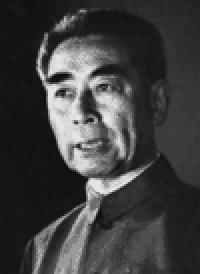
|
Communist Military Leaders of the Korean War
2. Zhou Enlai
Zhou Enlai was the most popular leader
in China during the 20th century. Even among the madness during the Cultural
Revolution, he continued to make an effort to pursue democratic ideas, while at
the same time supporting leaders like Mao. He exercised his diplomatic skill to
open China rather than isolate it from the rest of the world.
|
|
| Premier Zhou Enlai | ||
|
Life
In 1920, he went to France. In 1921 knowing that the CCP was
established in Shanghai, he became a member. During his study in France in
1922, he established the Chinese Communist's Youth Group. He
studied in England, and then Germany. He held prominent
military and political posts in the Communist party. From 1934 to 1935, he
participated in the Long March. And when the People's Republic of China was
established in 1949, he became premier and foreign minister.
In 1958 he resigned as foreign minister, but retained his title as Premiere. As
a practical person, Zhou maintained his position throughout all of Communist
China's ideological upheavals, including the Great Leap Forward of 1958, and
subsequently the Cultural Revolution. He made an effort to release comrades
imprisoned during the Cultural Revolution, and as a result Jiang Qing and Red
Guards criticized him. Before he became ill, in the early 1970s he was largely
responsible for China's reestablishing contact with the West. And on January 8,
1976, when he was seventy-eight years old, he died, just a few months before
Chairman Mao Zedong died.
|
||